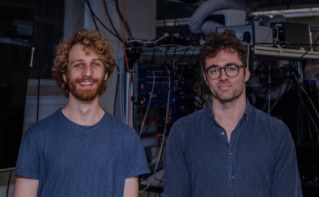Ashok Chauhan is an engineer-turned-physicist with a PhD in physics from the University of Bath. Having been a postdoctoral researcher for about six years, he now works as a senior scientist at Ceryx Medical, a research-led biomedical device company founded in 2016.

What skills do you use every day in your job?
My job involves collaborating with colleagues from physics, physiology, mathematics and engineering; based in both academia and industry. This means that the day-to-day activities I’m involved in are exciting but challenging at the same time, as none of us are experts in all aspects of the project. We have to work to understand each other’s perspectives and priorities. One of the key skills needed in such an environment is effective communication techniques, which help me to explain highly technical fundamental physics concepts to non-physicists while also helping me understand complex principles from beyond my areas of expertise. Developing the skills to communicate with different disciplines and sectors has been vital to ensure effective working and to minimize errors.
Working in diverse teams also means I am constantly learning and adapting, and finding interesting new ways to apply my technical skills and knowledge to real-world problems. In academia I mostly worked in labs, using experimental setups. However, since moving into industry I spend the majority of my time working on simulations and mathematical modelling. This transition has been challenging but rewarding, and has allowed me to develop the technical skills that are in high demand in my sector. Being adaptable and able to learn new skills on the job has made me a more well-rounded researcher.
What do you like best and least about your job?
I enjoy the diversity of the environment I work in and the applied nature of the physics we are conducting. Working in industry, I have engaged in research with real-world impact and am often involved in projects from concept to implementation. I have the flexibility to apply my ideas and explore interesting research questions alongside many collaborators, and can drive the research agenda of the company. This has given me more autonomy and independence than I could have had in a traditional academic environment, especially in the early stages of my career.
While the flexibility of my job is a real positive, it can be challenging at times due to the constantly changing nature of the work and the complexity of coordinating multiple collaborative activities. This becomes even more difficult when you consider we have colleagues in different time-zones. It does become more manageable as you gain experience, and in the process you learn invaluable organizational and managerial skills. Moreover, there is a great sense of personal and professional satisfaction when you successfully execute the collaborative activities.
What do you know today that you wish you knew when you were starting out in your career?
When I transitioned to physics from engineering, I thought that the skills I had gained in my previous training as an electronics engineer would not be very useful. However, I have used them in every research project I have worked on. I also found that having a mixed technical background helps me tackle a wide range of challenges in distinct ways. I wish I had known that having a non-traditional background and skills beyond specific technical aspects of physics could be beneficial when I made the transition to physics. As innovation requires more and more interdisciplinary work to address complex challenges, so having a wide skill-set is a real positive and I would encourage all early-career researchers to consider branching out beyond traditional subject-specific topics whenever they get the chance.
I also wish I had known that you can do fundamental research outside academia. After I completed my PhD, I initially thought that I would only have the opportunity to do pure research if I pursued an academic path. However, I have now discovered that there are great opportunities to build a research-focused physics career in industry. Recognizing that these career paths exist earlier in your career can be really beneficial to your long-term plans.



